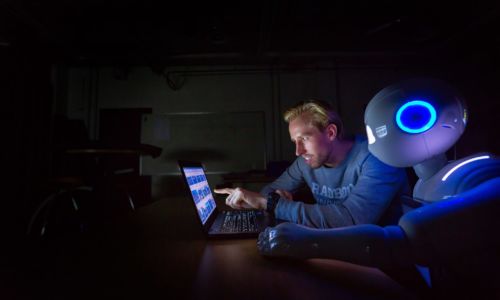-
 Via Pixabay
Via Pixabay
OPINION - The university should be less distrustful and suspicious of students when it comes to the use of chatbot ChatGPT, according to bachelor student Artificial Intelligence Pepijn van Manen. ‘Take a look together with students on how ChatGPT can improve education for all of us.’
University, please give students a chance to work with ChatGPT. I know it can be scary: we don’t know what the impact and limits of technology are yet, and yes, many students are intrinsically lazy and would like to do as little as possible to pass their exams. But our relationship does not only entail the university imposing exams and assignments on us for us students to make them whether we like it or not.
In the end, every student is here to learn, right? And the university is there to help us learn, so isn’t it time to talk less about how students can use ChatGPT to cheat and more about how we can improve education with ChatGPT.
What happened the last time when new technology turned education upside down? I can only imagine that a similar old guard of professors found it outrageous when their students started using Google for their research twenty years ago. They might have yelled that ‘Internet is unreliable’, or ‘You can only learn when you physically dive into the archives of the university library. Otherwise, you didn’t put in enough effort to deserve your diploma!’ In the meanwhile, it has become normal and accepted to consult Google for your questions during seminars.
‘The study physics already allows students to use a super calculator’
Something similar has been going on in studies like physics: students use Wolfram Alpha, a kind of super calculator/database that its creators consider the computational equivalent of ChatGPT. Although Wolfram Alpha could solve physics assignments theoretically, students barely make use of it. Yet, it is used to experiment with theories they have learnt during class, as it helps check calculations and it executes other boring and easy calculations. In short: it helps students better understand difficult subject matter that they are working on.
Blank page syndrome
With regard to ChatGPT, essays are the hot topic. And specifically, the fear that students will let the programme write their essays. I can tell you that I won’t be doing that in any case: in the first place, because the work from ChatGPT seems to be easily detected by plagiarism detector software. In the second place, because essays produced by ChatGPT are extremely wordy and nuanced, thereby making them super boring.
However, I do use ChatGPT as a helpful tool and ‘personal assistant’: starting a chat with the programme gives me the opportunity to brainstorm in an interactive manner – making it a miracle cure to combat blank page syndrome and to help me in the right direction. In addition, I give it commands to explain terminology from lectures, counterarguments to my own reasoning, relevant authors and essay proposals for further research. And yes, I also use it to make it do specific work for me that I don’t look forward doing myself. For instance, ChatGPT is great for writing an abstract for your paper or for transforming my ideas from bullet points to full sentences. Furthermore, polite emails to ask my professors for postponement of a deadline won’t be coming from my own hands anymore: AI can write those for me.
Einstein and Lovelace
This technology has even more potential to be revolutionary: I have noticed that talking to an expert programme offers a unique, interactive and with that, an extraordinary engaging way to learn your subject matter. In the future, this may develop into a personal digital tutor that can track your entire education trajectory, test your knowledge and challenge you with personal assignments – a similar form of education that physicist Albert Einstein and mathematician Ada Lovelace have received in the past.
‘ChatGPT is inhumanly good in the summarising and processing of texts.’
Because ChatGPT is so inhumanly good in the summarising and processing of texts, it offers numerous interesting opportunities: you could let it automatically make summaries of the transcriptions of your lectures. Subsequently, you could let that summary transform into flashcards of the subject matter of last week and let that be repeated to you every morning in an app that resembles Duolingo.
Despite these potential opportunities, there might also be some risk for our education system: what if this science fiction Duolingo will only appear on the private market for a high price? As a result, only students who are able to afford it will get access to these efficient techniques, leading to more inequality in education. That is why we should want universities to think of the future and invest in these learning techniques, before they are caught up by commercial alternatives.
Calculator
Universities, please do not make the same mistake as our math teachers in primary school, when they told us that we ‘would not always have a calculator in our pockets’ and therefore encourage us to do everything in the old fashioned way. We already know the end of that story: everybody has a calculator in their pocket nowadays. GPT also seems to be here to stay: we might keep using this technology in a form that helps us in the future. By integrating GPT early on in our education system, we could better prepare students for the labour market.
There is still reluctance towards other information innovations used by students in their daily lives, such as Wikipedia and YouTube (I still find it surprising that professors can be upset when I don’t show up to their lectures, as if there isn’t a much better explanation of Bayesian statistics on YouTube). But, with a view to the future, have a better approach this time, and take a look together with students on how ChatGPT can improve education for all of us.
Translated by Sophie Verhoeven


